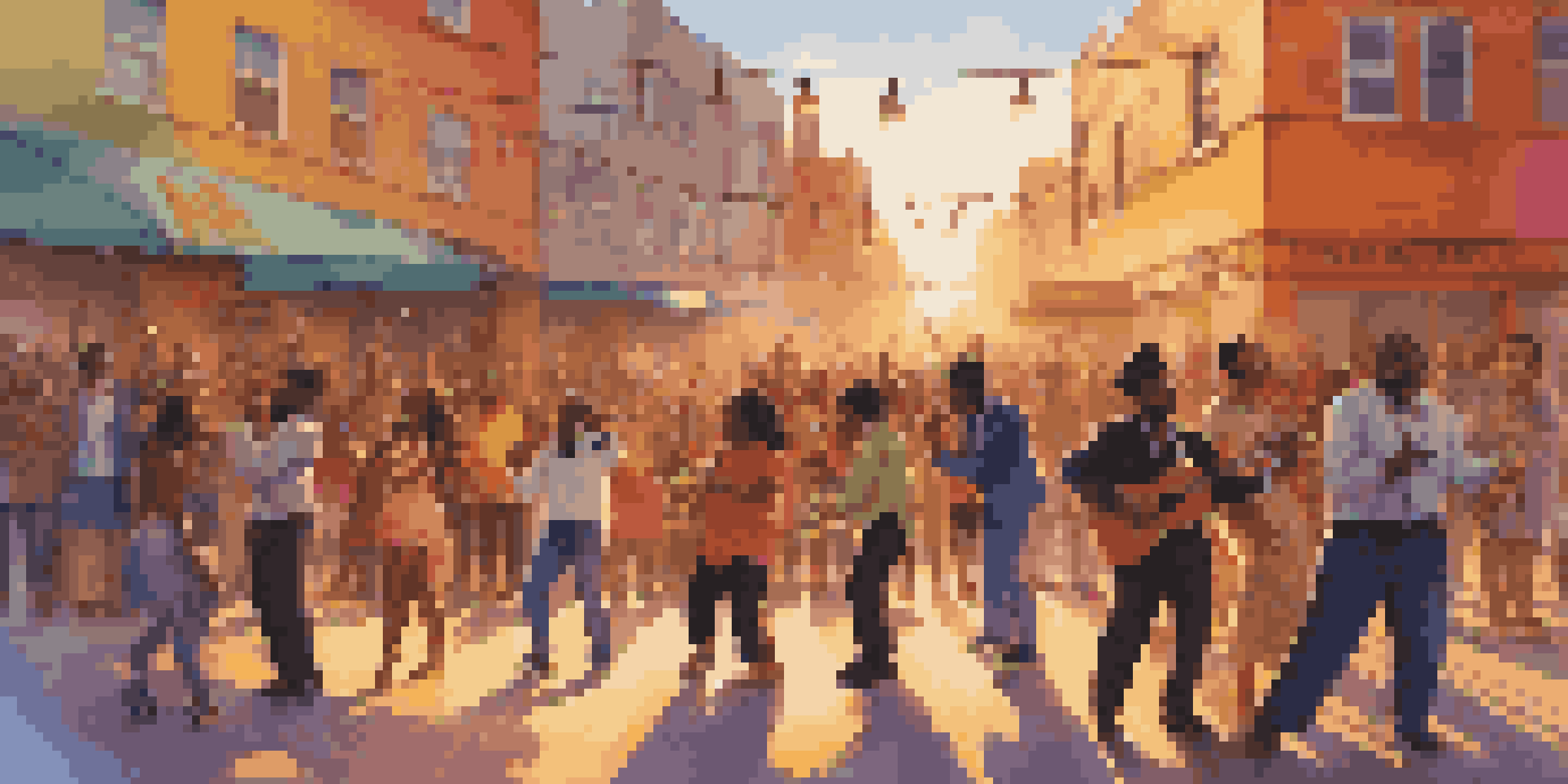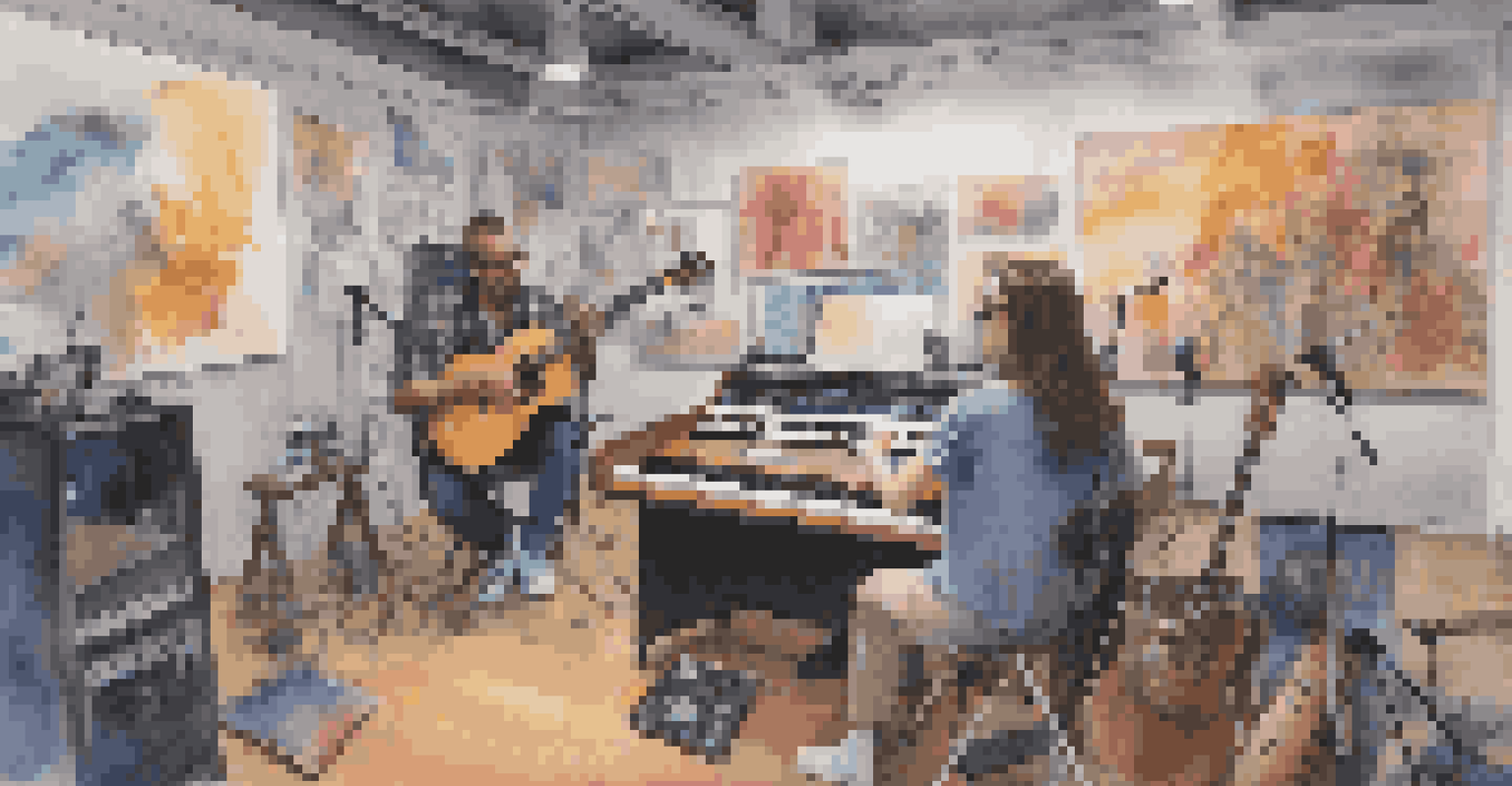The Role of Social Media in Shaping Music Industry Trends

The Rise of Social Media in the Music Scene
In the past decade, social media has revolutionized how music is discovered and consumed. Platforms like Instagram, TikTok, and Twitter have become essential tools for artists to connect with fans and promote their work. This shift has not only changed the way music is marketed, but it has also democratized the industry, allowing independent artists to gain visibility without traditional gatekeepers.
Social media is not just a tool; it’s a way for artists to connect with their audience and build a community around their music.
For instance, TikTok has launched countless songs into the spotlight, turning previously unknown tracks into viral hits overnight. The platform’s algorithm favors catchy hooks and entertaining content, making it a breeding ground for the next big music trends. As a result, artists are now tailoring their music specifically for these platforms, which is a significant shift from the traditional music release strategies.
Moreover, the immediacy of social media allows artists to receive real-time feedback from their audience. This interaction can foster a sense of community and loyalty, as fans feel directly involved in an artist's journey. As social media continues to evolve, its role in shaping the music landscape is likely to grow even more prominent.
Creating Viral Moments and Trends
Social media has an uncanny ability to turn a simple moment into a viral sensation. Think of the numerous dance challenges that have taken over TikTok, where users create and share videos set to specific songs. These trends can lead to an exponential increase in streams, downloads, and sales, propelling a song to the top of the charts almost overnight.

One famous example is the song 'Old Town Road' by Lil Nas X, which gained massive popularity through TikTok challenges before breaking records on Billboard charts. This illustrates how a single platform can redefine a song's trajectory and shape its cultural significance. In today’s music industry, creating a viral moment is often as crucial as traditional marketing methods.
Social Media Transforms Music Discovery
Platforms like TikTok and Instagram have revolutionized how music is marketed and consumed, giving independent artists unprecedented visibility.
Furthermore, artists leverage these viral trends to maintain relevance and engage their audience, often participating in challenges themselves. This not only strengthens their connection with fans but also keeps their music in the conversation. The interplay between artists and social media users creates an exciting dynamic that constantly influences music trends.
Influencer Collaborations and Marketing
Influencers play a pivotal role in promoting music on social media. Many artists collaborate with influencers, who have large followings, to reach a broader audience. These partnerships can take various forms, from sponsored posts to entire campaigns, effectively merging the worlds of music and social media.
In today’s digital age, the path to success in music is often paved with viral moments and social media engagement.
For example, when a popular influencer shares a new song or participates in a challenge related to that song, it can lead to significant boosts in visibility and engagement. This strategy not only helps the artist gain new listeners but also solidifies the influencer’s relevance in the music scene. The right collaboration can create a win-win situation for both parties involved.
Additionally, brands are increasingly recognizing the power of music on social media. By aligning themselves with artists or musical trends, they can tap into the audience's emotions and preferences, making their marketing efforts more effective. This synergy between music, influencers, and brands is reshaping the way music is marketed and consumed.
Fan Engagement Through Social Media
Social media platforms provide artists with direct lines of communication to their fans, fostering deeper engagement. Artists can share behind-the-scenes content, personal stories, and updates, making fans feel included in their artistic journey. This connection is invaluable in building a loyal fanbase that is more likely to support the artist’s work.
For instance, artists often host Q&A sessions on Instagram Live or share their thoughts on Twitter, sparking conversations and creating a sense of community. Fans appreciate this transparency, as it allows them to connect with their favorite artists on a more personal level. This engagement can lead to dedicated support during album releases and tours, translating into tangible success.
Viral Trends Boost Music Popularity
Social media can turn songs into viral hits through challenges and user engagement, significantly impacting an artist's success.
Moreover, social media enables fans to interact with one another, forming communities around shared musical interests. These connections can amplify an artist's reach and impact, as fans share their passions and experiences online. The collective energy of engaged fans can propel trends and elevate an artist's profile in the competitive music landscape.
The Impact of Streaming Services
While social media is a powerful tool for promoting music, streaming services also play a significant role in shaping industry trends. Platforms like Spotify and Apple Music have not only changed how we listen to music but also how artists distribute and promote their work. The integration of social media features within these platforms enhances the overall experience for both artists and listeners.
For example, playlists curated by influencers or popular social media figures can lead to a surge in streams for specific songs or genres. This exposure is often a game-changer for emerging artists trying to carve out their niche in a crowded market. The synergy between streaming services and social media creates a powerful ecosystem that drives music discovery and consumption.
Furthermore, streaming services often analyze listening habits and user interactions, providing artists with data that can inform their marketing strategies. By understanding which songs resonate with listeners, artists can tailor their content and promotional efforts accordingly. This data-driven approach is becoming increasingly important in a fast-paced industry where trends can change overnight.
The Role of User-Generated Content (UGC)
User-generated content (UGC) has transformed the way music is consumed and shared on social media. Fans are no longer just passive listeners; they actively participate by creating their content, whether it’s dance videos, covers, or memes based on their favorite songs. This shift empowers fans and amplifies the reach of an artist’s music.
A great example of this is the 'Savage Love' challenge, which saw countless users creating their dance routines, helping the song gain traction. UGC not only promotes the original track but also creates a sense of community as fans engage with each other’s content. This organic promotion can often outpace traditional advertising methods in terms of reach and authenticity.
Engagement Builds Artist-Fan Loyalty
Direct communication via social media fosters deeper connections between artists and fans, leading to increased support and community building.
Moreover, UGC fosters creativity and innovation in how music is presented and perceived. Artists can find inspiration in the content created by their fans, leading to new collaborations or ideas for future projects. This collaborative spirit between artists and fans is a hallmark of the modern music industry, showcasing the profound impact of social media.
Challenges and Criticisms of Social Media in Music
Despite its many benefits, social media also poses challenges for artists in the music industry. The pressure to maintain a constant online presence can be overwhelming, leading to burnout or a diluted artistic vision. Artists may feel compelled to prioritize social media engagement over their creative processes, which can impact their work negatively.
Additionally, the fast-paced nature of social media can lead to rapid trends that come and go in the blink of an eye. This makes it challenging for artists to maintain momentum and ensures that their work is consistently relevant. The fear of being forgotten can push artists to chase fleeting trends rather than focusing on their unique style and message.

Critics also point out the potential for toxicity on social media platforms, where artists can face backlash or harassment. Navigating this landscape requires a strong sense of self and resilience, as negative feedback can be just a click away. Balancing the benefits of social media with its challenges is an ongoing struggle for many artists in today’s music industry.